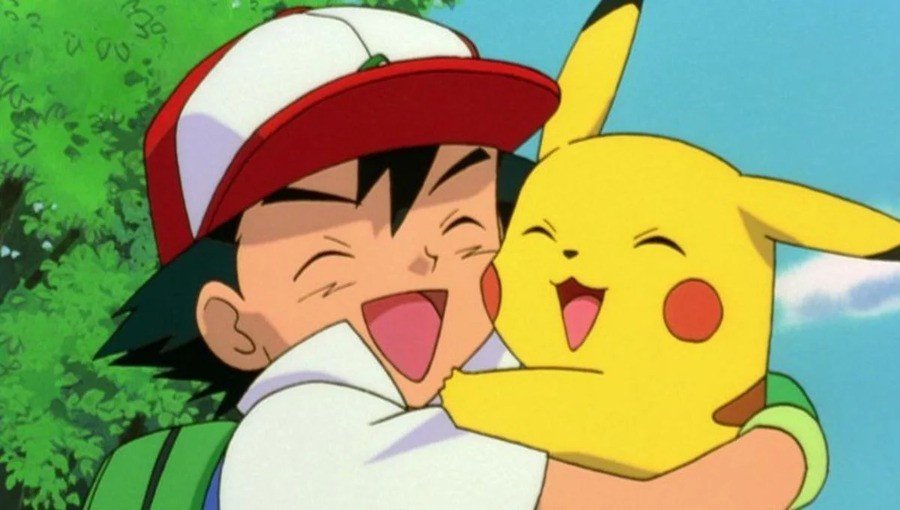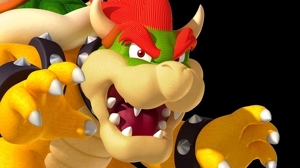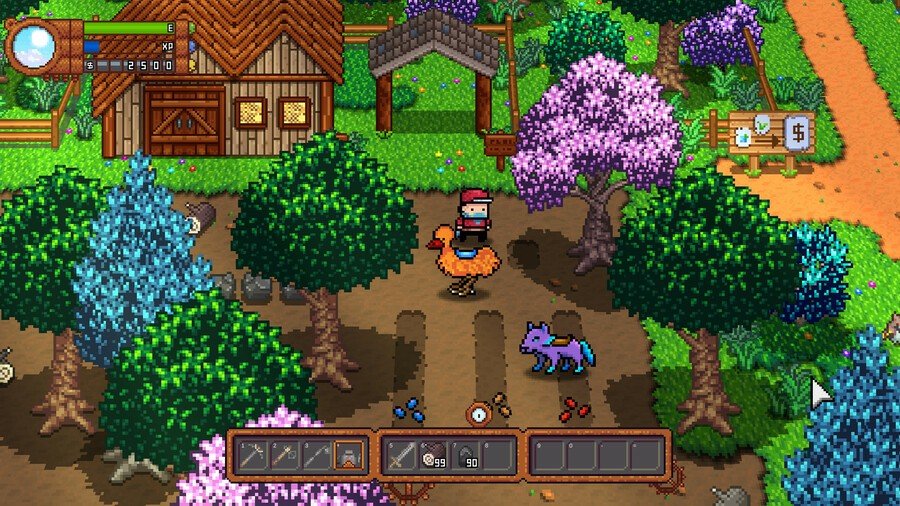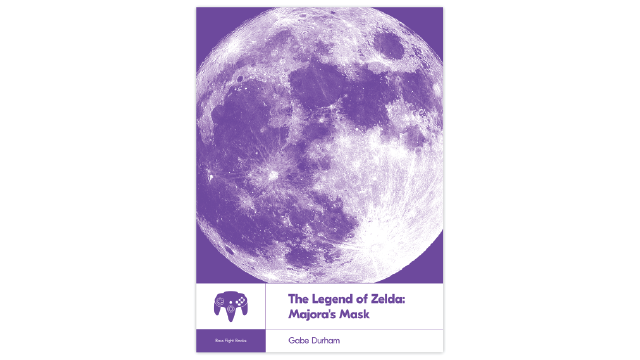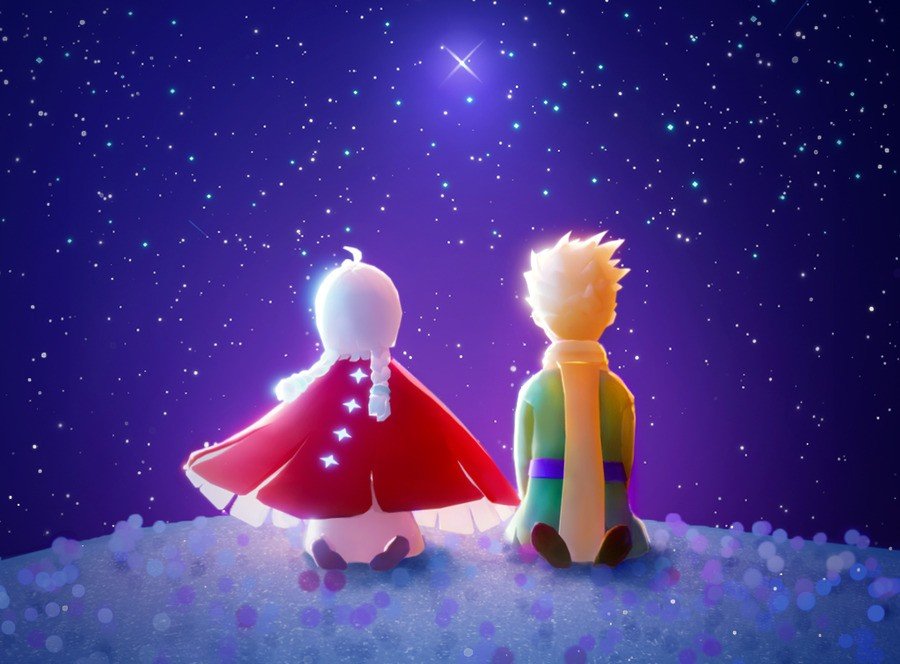
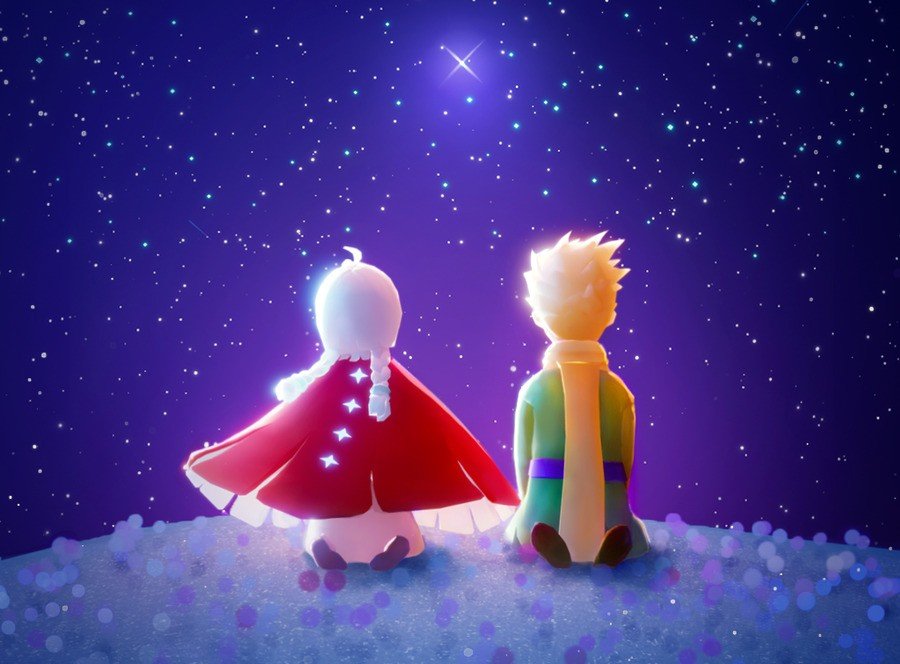
The Switch eShop had a notable recent arrival, with thatgamecompany making its Nintendo debut with Sky: Children of the Light. It's a studio that achieved notable acclaim in a period of PlayStation exclusivity, with titles such as Flower and Journey setting high standards in artistry and emotional impact. After Journey, however, there was a change in focus as work began on Sky: Children of the Light. No longer focused on PlayStation, after a number of years it arrived as a free-to-play title on iOS and Android; on the surface that may seem rather surprising.
The game has earned a sizeable audience over the past 2+ years, and its move to Switch is an intriguing one. Though the idea of 'free-to-play' or 'free-to-start' immediately comes across negatively to some, this title does do things rather differently, unsurprisingly considering the team that's created the experience. We've enjoyed our time with it so far, giving it a recommendation in our Sky: Children of the Light review.
We were fortunate to talk recently with thatgamecompany's President & Creative Director – Jenova Chen – to learn about the game, the team's goals and motivations, and what makes it a valuable gaming experience as it arrives on Switch. We also cleared up how the free-to-play model and its seasons work, with the answers making it clear that this is a game that the developers want everyone to experience properly, regardless of how much they decide to invest.
We start off with an introduction to the game from Mr Chen.
Sky is a social adventure game where players come together to usher the light back into the world. It’s a game that inspires compassion, wonder and friendship for the players, and it’s a virtual theme park. During this trailer I show two year’s worth of content that came across eight different seasons, and there are many different stories and types of experience. For example there is a season about using magic to turn a desert into an oasis. There is also a season where we take players to a tropical island for a summer vacation, the Ethereal Dungeon that challenged players, and more.
In a season, the player not only gets to visit the world and fantastical locations, but the most important thing is that Sky is a game about social connections and friendships. Little Prince is the first IP collaboration – not only do you get to witness his story and see iconic characters from the book, re-adapted into the world of Sky, the more important part is that you interact with The Little Prince. You can hold hands with him, play hide and seek, he is going to leave you with amazing parts of the book like the absurdity of adulthood, and you can take him on a flight as well.
What were the main factors that drove the decision to bring Sky to Switch?
We left PlayStation back in 2012 after Journey, because a lot of people that wrote letters to us – about 1600 letters – many of them said “this is the first game my wife watched me play through or played herself and cried. And this is the first game my daughter wants to play. Can you make Journey a game where I can play with my wife and daughter?”
I realised that our game is not meant to be played by one group, but by everybody. At tgc (thatgamecompany) we aspire to build games that earn respect from society. We want to see video games, the medium we love, to be embraced by people of all ages. Even today people ask “are you a gamer?”, because they assume that like movies and music there are certain types of games that you enjoy and you become ‘a gamer’, but there are other types of emotions that you don’t necessarily get from games.
So we thought in order to make a game that people of all ages and genders can enjoy, it has to be on a platform that reflects that demographic. When we started building Sky, in 2012, we thought that mobile would be the platform. But really it’s cross-platform, and we feel that in the future pretty much the same games will be played on all platforms, and that trend is already happening. After we made the mobile version we felt that the most affinitive console platform was Nintendo Switch. The sheer amount of content and emotions, we feel Switch represents families, men, women, children, and all adults as a platform. That’s why we picked Nintendo as our very first console platform.
I realised that our game is not meant to be played by one group, but by everybody. We want to see video games, the medium we love, to be embraced by people of all ages.
A question about reaching the Switch audience. Do you expect differences in how Switch owners approach the free-to-play model?
We had a very big debate, even in the early days when I talked to Nintendo. They recommended that we go ‘Premium’, they said premium is the way to go for Indies and they know that players, particularly Nintendo players are very friendly to Indie titles. There have been many great successes on the Nintendo platform. However we are an online virtual theme park with millions of players who have already built up their friendships and networks. It would be weird to keep the Nintendo version in a silo, right? A lot of people want to play with their friends, and they might not have good iPhones or Android phones, maybe the only platform they have is the Nintendo Switch.
When the economy connects it doesn’t quite work if you have a premium title where everything is charged up front vs a game that is freemium. When you connect those suddenly it’s a case of “well, how do you have that hat, I don’t have this hat!”. So, there’s a bunch of animosity and competition that can happen. So in the final process we want to make the player feel that the world is fair for everyone, so that’s why we chose to stay with the free-to-start system.
The interesting part of this is that we spent 7 years building Sky, and we built a whole journey of content on the main path, where if you play that it’s completely free. You don’t need anybody to help you, and you can experience the whole thing. After that, if you stop playing the game you can walk away and we haven’t charged you anything. The only reason people stay in free-to-play games and decide to pay is usually because of social reasons, because there’s a community and if you care about that social standing among friends. For example if your friends all have a certain hat, you wonder whether to conform to those friendships and get the same hat. But, it’s up to you.
So, I know a lot of people are negative to the free-to-play mode, we were as well, and when we first made Sky it was a premium game. But the economic system on iPhone and Android doesn’t allow premium games to survive. That’s why Apple Arcade came out, because a lot of quality games that come out and try to speak to your heart often don’t get a chance to be played, because everything else is free. So we had to make the game free, but whether you want to give us money or not depends on whether you like us and care about the friends you’ve made in the game.
It’s interesting that there’s an importance on relationships and friendships with other players. I noticed when playing on Switch that when you meet other players you can’t tell what platform they’re on, and in a sense it doesn’t matter. Is that at the core of what you're trying to achieve?
Our fans told us they wanted to play with family, for example, but they don’t have multiple PlayStations hooked up to multiple TVs. So we thought it’d be great if every device at home can play this game, so there’s no excuse to say “I don’t want to be part of it”. So we worked on mobiles and tablets, and then Switch is usually the centre of the home, you have a big TV. So it took us a much longer time to upgrade our mobile game to the console quality. Now, you can have someone play on the TV and someone else join in on their phone or tablet, and that’s the vision we had when we started this project.
Did that introduce different challenges in terms of how you structure content moving forward? In terms of player habits on Switch perhaps being different from short play sessions on mobile?
What’s really important is the connections and friendships, the family we have, the memories between us. Sky is very much a game about building the ties and connections.
What we’ve noticed, as the game has been out for two years, what we see is on average people spend 90 minutes to two hours in the game every single day. So most of them play the game after they get home, maybe when they relax in bed before they go to sleep. It’s a very relaxing game, there’s no combat, no horror, so it’s a game that helps you to find a peaceful connection. The most common words used in our community is that “this is the most wholesome game I can find on Discord”. So it’s a game that helps you heal and feel connections, I think, that’s the most important part.
When we first started this project, The Little Prince was actually a very important source of inspiration. The core message of the book is that many of us grown-ups are obsessed with things like money, popularity, things that are not actually essential to the happiness of life. What’s really important is the connections and friendships, the family we have, the memories between us. Sky is very much a game about building the ties and connections.
We have many players send letters to say that friends they made helped prevent them from taking their own lives, because there are a lot of people that feel depressed in today’s world. Friendships become very important, and that’s why we think Sky as a virtual theme park can continue to serve players and build bonds.
Do you see the virtual theme park of Sky almost as a platform, rather than a game? Is it a world and community that you aim to continue growing and expanding for quite a long time?
Yes, we have more players than I could have ever imagined, and a lot of these people really formed relationships and some have been playing for over two years, since the beta. I’ve seen people during Covid use the game as a way to stay close to their family, I’ve seen people married after playing Sky. I’ve also seen almost ‘virtual families’ formed, people like a single dad would form a virtual family in the game. They may create a support group where they seek emotional support from each other. I’ve seen a Hawaiian lady, almost 70 years old, she never thought she could find a true friendship at that age, she still feels a sense of bonding and love through playing this game.
My mother-in-law is 67 and plays three hours a day because of friends she made. So we’re going to try to keep this theme park open as long as people find relationships they build meaningful.
To make it artistic you have to channel your own voice and emotion; make the gameplay and music and visuals polished to the point where they all speak the same thing, and then you can touch somebody.
You and your team have a strength in allying these ideas with strong presentation, audio and visual. How big a focus do you put on those aspects like the soundtrack and art design?
For the first half of our career at TGC we’ve been trying to prove that video games can be art, we want to put a video game in a gallery and show that we’re not just a distraction of time. To make it artistic you have to channel your own voice and emotion; make the gameplay and music and visuals polished to the point where they all speak the same thing, and then you can touch somebody. That’s why we’ve always been honing our craft, and that is why I feel we’re a theme park and not a playground.
A social network is a place where people talk and make friends, but there are no values, ambience or narratives. In a theme park we have stories we tell, and the stories we tell have universal values, and every gameplay system we design – how do you make friends, how does the gift system and economy work – everything we make we try to have value so the community feels wholesome and altruistic.
If we didn’t make those designs, I’m pretty sure this would become like a lot of other social games, where society almost goes into a wild orgy if you don’t control it. So for us it’s about using all of the methods that we know to nudge everybody to show more of the brighter side of their humanity. Small things like we make all of the chat locations in the public space. We don’t want people to go into private rooms and start talking about very inappropriate content, but having the space open means people realise that what they say will be heard, so they tend to say something more positive.
Earlier any player could leave a message on the ground for their friends, so there’s a lot of sexy jokes etc. But then we exposed the names of the people who left the notes to their friends, so then everyone goes into the game to try and erase their messages because they had thought they were anonymous. But then their friends could catch them and say “you wrote that?”. Then they remove them. So small designs can make a big difference in how people treat each other and the general vibe of the community.
As a practical question, for players that will be completely new to the game, can you explain the structure of the seasons and how they’re purchased, for example?
The game is free, and there’s nothing blocking you to making progression. The seasons you can experience all of the story for free. So with The Little Prince you will experience all of his story for free. If you participate in the season by paying you get double rewards, if you don’t pay you still unlock a lot of interesting content based on the season.
It’s happening over three months, and The Little Prince story will unfold every week, so don’t expect to come in day one, play for 24 hours and finish the whole thing! Instead it’s almost like tuning in each week for a television series. During that time if you come every day you can participate more and unlock more outfits, props and so on. But if you don’t care about that and what gadgets and tools you have, you don’t have to play it. You can come every week to just experience the main content, and if you finish the story we’ll be thankful that you’ve played it.
The Little Prince is a very important literary masterpiece and we want to share it with everyone. If you really love the content and want to be in for the season the option is there to buy the season pass and wear something quite different.
As a final question, do you have a message for new players on the Nintendo Switch?
I think we are always grateful to our players, it is their letters that inspired us to start thatgamecompany. It’s their letters that encouraged us to make games that are not about guns and violence and competitions, and they want us to make games that show games can be art. They want us to make games that could make people feel respect.
So we tried our best to work on this game for almost 9 years, and we’d really appreciate if you give us a chance and try the game. If you like it please share with you friends, particularly friends that don’t play video games. That’s our purpose making this game.
We'd like to thank Jenova Chen for his time; you can download Sky: Children of the Light now on Nintendo Switch, and get regular updates on events and more on Twitter – @thatskygame
